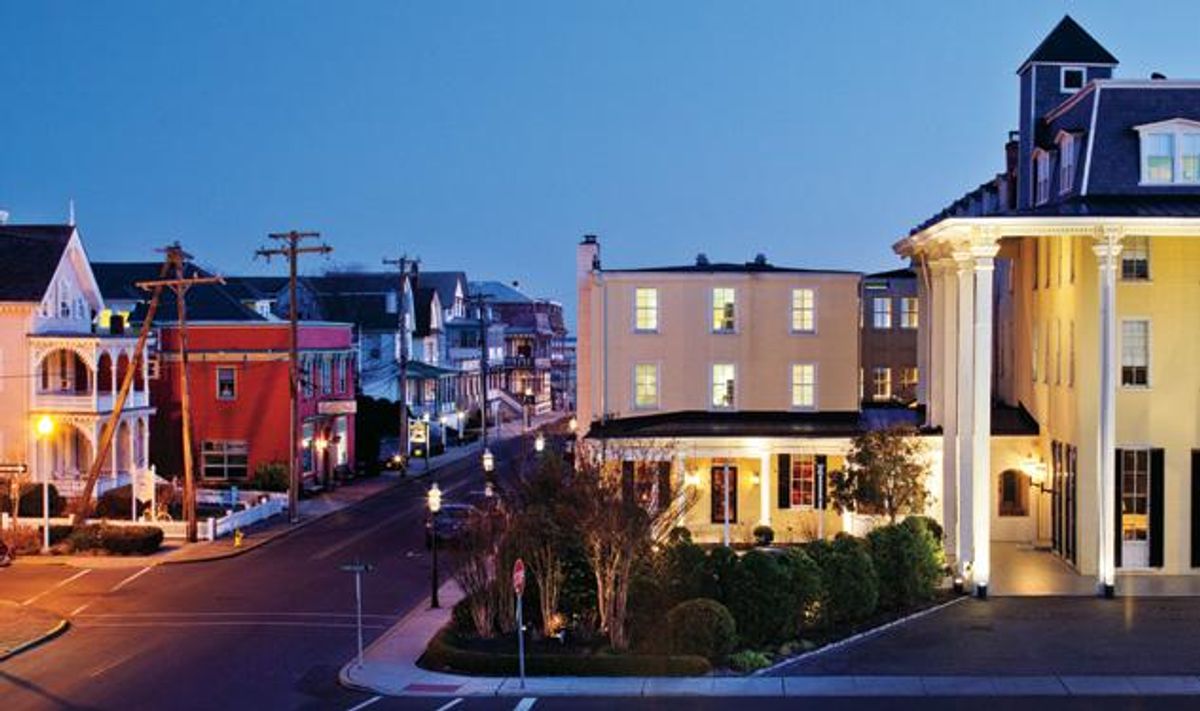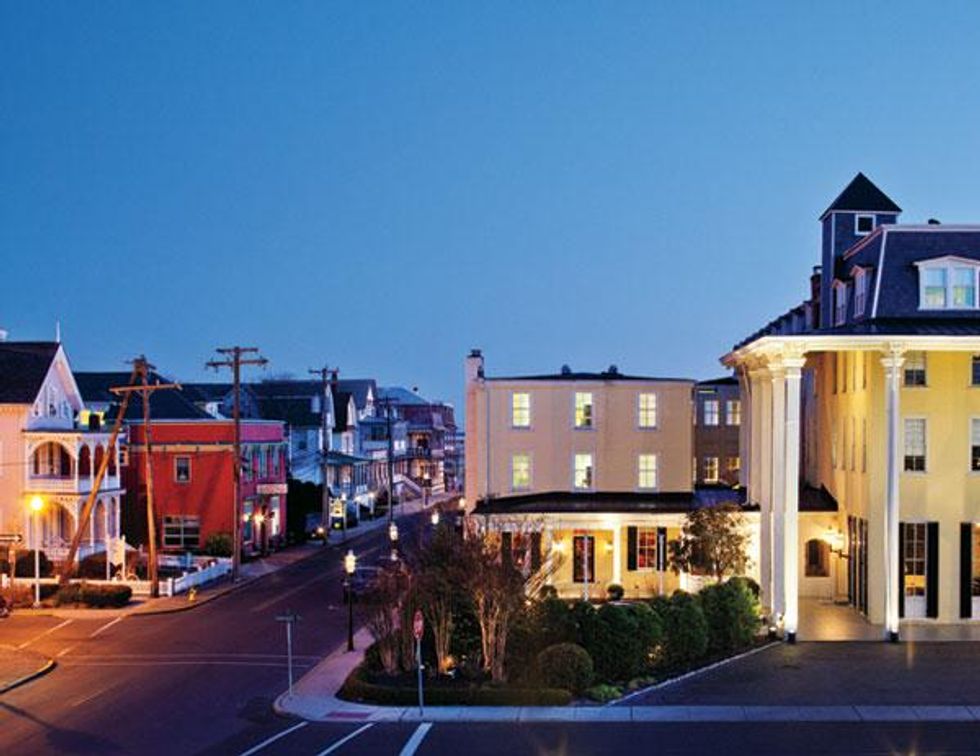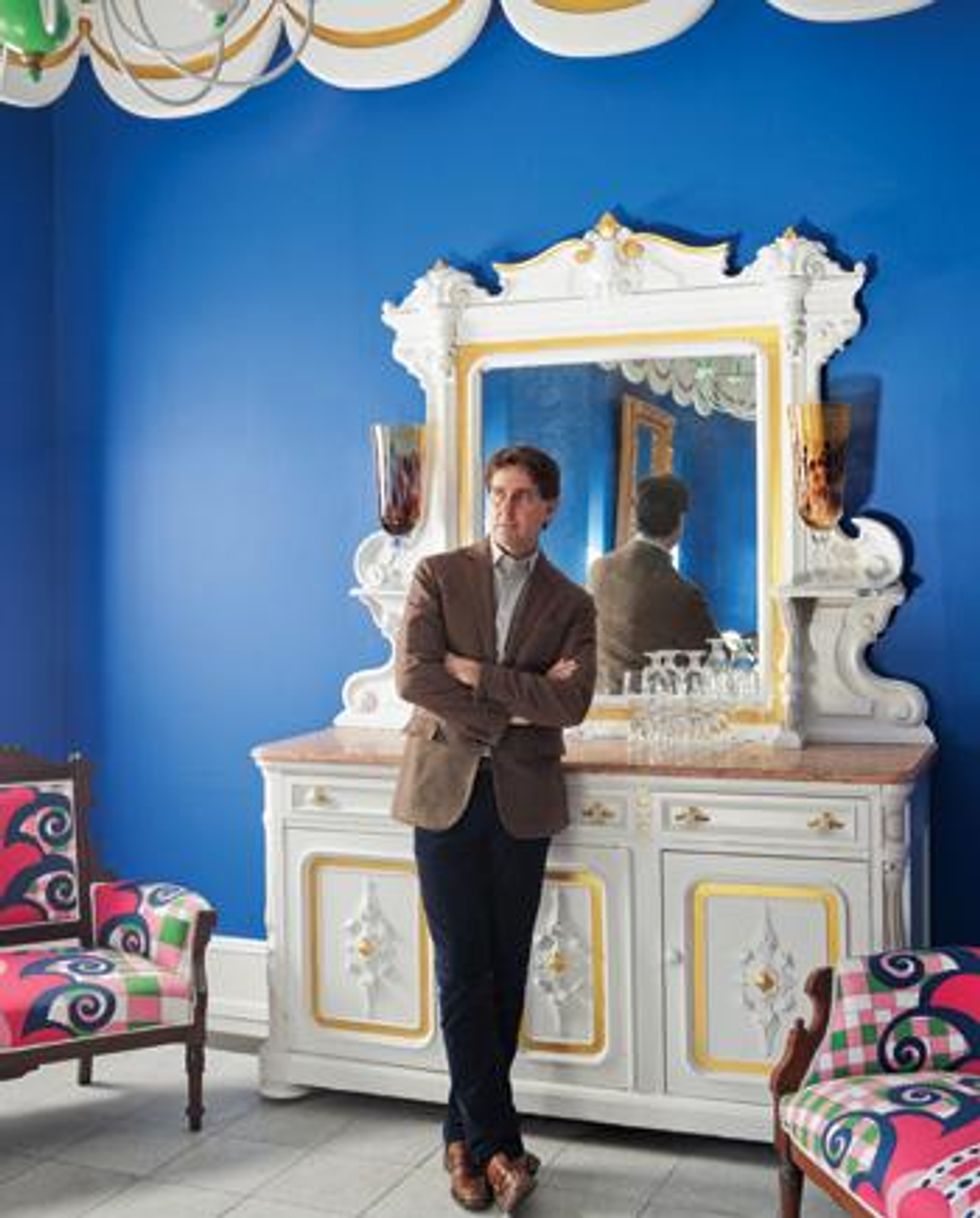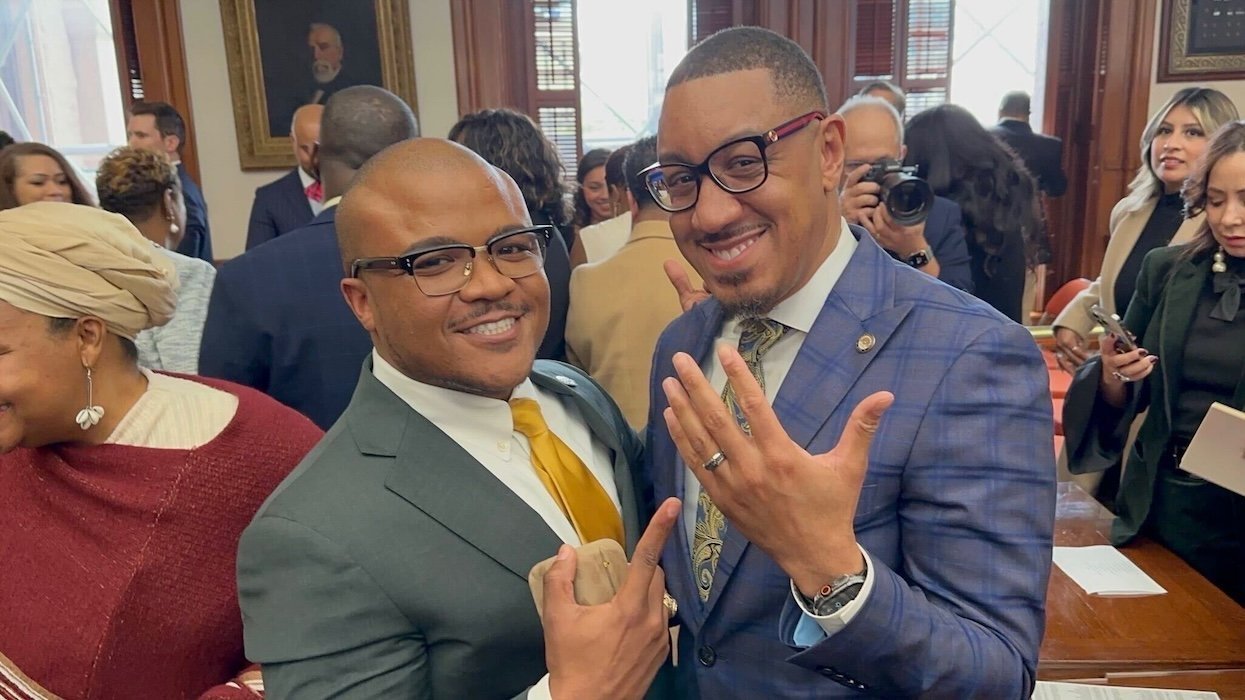
Photography by Ofer Wolberger
The summer of '77 was particularly magical for Curtis Bashaw. As in previous years, he spent it working at Congress Hall in New Jersey's fading Victorian resort town of Cape May, a three-hour drive south of New York City. It was the summer of disco and the apogee of gay liberation, but Congress Hall, a former hotel-turned-Evangelical center by Bashaw's fire-and-brimstone grandfather, was filled with young volunteers who had come to serve God. "I was 17 and living in the boys' dorm room," recalls Bashaw. "We'd finish in the dining room, do our clean-up to Fleetwood Mac's Rumours, and then run to the boardwalk and sneak cigarettes."
Although Bashaw's grandfather, Reverend Carl McIntire, had salvaged the decrepit Congress Hall in 1968, after using his daily radio address -- the "Twentieth Century Reformation Hour" -- to raise funds for its purchase, the sprawling building was sliding irretrievably into ruin. From his perch on the boardwalk that night, under a full moon, Bashaw looked up at the hulking shadow of his grandfather's bequest. "I remember having this late-night moment and thinking it would be really cool one day to fix this place up," he says.
It would take another 25 years -- and $25 million -- but in 2002, Bashaw got to stand alongside former New Jersey governor Christine Whitman, in front of several hundred invited guests, and declare a renovated Congress Hall hotel open for business. White doves were released to fly above the crowd; a local minister led the congregation in prayer. There were cocktail receptions, a gala dinner, and dancing. It was barely three months after Bashaw's grandfather had died, at 95 years old, and the reopening of the hotel, with its storied history dating back to 1816, was a vindication of sorts for the grandson.
McIntire, who had taken on communists, liberals, and Nixon--and whose far-fetched schemes included rebuilding the Temple of Jerusalem in Florida and a theme park celebrating the Vietnam War -- had not been popular with the locals. Lifeguards had thrown tomatoes at him for fighting to keep the town's beaches off-limits on Sundays; he'd engaged in a long-running and very public feud with city authorities over property taxes; and as the popularity of his broadcasts waned through the '80s, the very buildings he'd rescued (when preservation was a foreign concept) came to be seen as symbols of blight and neglect. By 1994, with McIntire deep in bankruptcy proceedings, only the ground floor of Congress Hall remained in use; a second much-loved building, the Christian Admiral Hotel, had to be demolished two years later. Now, Bashaw was able to bequeath the town -- and his grandfather -- a happier legacy.
"During the party, I walked out onto the lawn and looked back at the lights, with the sound coming out of the ballroom," says Bashaw, sitting in a spacious office in Manhattan's SoHo and proffering bowls of popcorn and raisins. "It's a cliched moment, and there are plenty of bigger dreams in the world, but it was definitely very moving."
Bashaw, now 52, is an inveterate host, and learned from his mother that "when the rollercoaster is about to leave the tracks, you put your best foot forward -- company is coming, and once it gets here, you have to be focused on them, not on the details." It's the kind of advice he now dishes at staff orientations for the 1,500 people he employs annually in his five Cape May hotels (additionally, with his business partner, Craig Wood, he owns the Chelsea Hotel in Atlantic City and the Mondrian SoHo in New York City). "It's my one outlet where I'm allowed to be a preacher, like my grandfather was," he says. "I tell them our mission statement: We're a family of hotels providing welcome. And what's the etymology of 'welcome'? It comes from the word 'weld,' and it means 'to join.' "
This is something of a theme for Bashaw, who talks a lot about the value of personal and community integration. "I was always a natural integrator, and I always refused to be identified by my sexuality first," he says. "I never felt like an Uncle Tom in doing that -- I just didn't feel I needed to." Visiting New York City in his twenties, he was struck by the tendency of gay men to form exclusively gay networks. "In late-'80s New York, it was very easy to hang out with people exactly like you," Bashaw says. "Whereas in a small town like Cape May, if I wanted to hang out with people like me, it would be a party of four or five. So you end up integrating more. In a way, I felt I was having more impact on my little town than I was in New York, where it felt easier to be indulgent in a way that didn't push boundaries."
Bashaw is aware of the irony that his grandfather's legacy in Cape May rests on the shoulders of the town's most prominent homosexual, but he also loves to view the history of Congress Hall as a series of custodians, passing the baton down through the generations. Each leaves something of them behind. Although a secular hotel these days, the focus on classical entertainment and seasonal rituals at Congress Hall owes much to McIntire's influence. Bashaw is a big proponent of encouraging guests to abandon their cell phones for old-fashioned entertainment that brings people together -- group sing-alongs on the lawn, ceramics classes on the veranda, and tree-lighting ceremonies at Christmas.
"He is an extremely sophisticated and sensitive guy, and his appreciation of historic and down-and-out properties is something that I share," says the hotelier Andre Balazs, whose own properties, including L.A.'s Chateau Marmont and the Mercer in New York City, reflect a similar sensitivity toward the bones of old buildings.
For the novelist Jay McInerney, a frequent visitor to Cape May, the key to Bashaw's success has been to make Cape May hip, while still honoring "its middle class, New Jersey, saltwater-taffy soul." It's what Jack Wright, editor of Exit Zero, a Cape May magazine that draws on a similar romance with the past, describes as Bashaw's lack of snobbery. "This is not the Hamptons, not even close," he says. "There's a playfulness about everything he does, infused with a high regard for quality."

Much of the playfulness is the contribution of Bashaw's sister, Colleen, who oversees the hotels' interior design. In their most recent act of restoration, the pair took an unprepossessing 1970s seafront motel, the Coachman Inn, and turned it into the Beach Shack, a retro-themed family motel, complete with original laminated dressers, that Wright describes as "Mad Men on vacation."
When he came to stay with his wife and daughter shortly after the reopening of Congress Hall, then-governor of New Jersey, Jim McGreevey, was quick to recognize Bashaw's skills and soon lined him up to run the influential Casino Reinvestment Development Authority, which oversees gaming tax revenues of $250 million. Bashaw recalls chatting with the governor while he was dining in the Ebbitt Room at the Virginia (Bashaw's first Cape May hotel, bought with the help of his father, an attorney, in 1986 and immaculately refurbished). "He said, 'I can't believe these places are in New Jersey,' " recalls Bashaw, a fierce cheerleader for what he calls "the un-harvested brand" of the Jersey Shore. "I said, 'Well, you have the same bias as everyone else, and you're governor -- come on!' "
But McGreevey also saw in Bashaw a confident gay man who had successfully integrated his sexuality into the rest of his life. Two years later, when the governor was struggling to come out in the face of a looming scandal over the appointment of his lover, Golan Cipel, as his homeland security advisor, it was Bashaw that he turned to for help -- and the man he asked to edit his resignation speech. "It was the scariest time as a gay man for me -- everyone just assumed that I must be another one of his lovers," says Bashaw, who still bridles at the memory of one reporter who planted rumors in a local bar by asking leading questions, only to return two weeks later to find her innuendoes had taken root. "When she asks the question next time, of course someone is going to say, 'Yeah, I've heard that,' " he says.
Throughout the upheaval, one constant was Bashaw's partner, Will Riccio, a Cape May native. The two had met at the reopening party for Congress Hall two years earlier and quickly formed an attachment. "I came out right when I met Curtis," says Riccio, who was 21 at the time and impressed with Bashaw's approach to life. "He's very passionate and positive -- he sees possibilities for everything."
Although McGreevey's resignation hastened Bashaw's departure from the CRDA (he was asked to stay on, but left after 18 months), it inspired one of his most expensive projects, the $112 million non-gaming hotel, the Chelsea, in Atlantic City, not far from his grandfather's first church. "I felt like Atlantic City had been co-opted by these carpetbagger casino companies that hadn't put anything back," he says. "They'd just put these boxes on the beach -- no windows. They didn't celebrate the town, they just wanted people inside. And here is this place with this amazing street grid, with this texture going back hundreds of years." Opened just as the U.S. was tipping into recession, the Chelsea, which has ocean views and a heated seawater pool, but no slot machines or gaming tables, has struggled to recoup its costs, unable to compete with hotels that make up in casino earnings what they lose in massively discounted rooms. "Every good quality can also be your undoing if you're not careful," Bashaw concedes, aware that his nostalgia for Atlantic City's past may have clouded his judgment.
But if the recession proved challenging to his ambitions, it also underlined the prescience of his operation in Cape May, where the hotels -- developed with Craig Wood--presaged a shift away from the flash and ostentation of the '90s and toward a simpler American classicism. After the collapse of Lehman Brothers in 2008, that kind of low-key elegance became even more appealing. Now, Bashaw is ready to export it up the Eastern Seaboard, starting with a new property, the 37-room Chequit Inn, on New York's Shelter Island. "You see a lot of bicycles with ribbons on them, a lot of farm stands that aren't so pristinely branded and marketed," he says of the tiny community at the tip of Long Island , which hasn't changed much since the 1870s, when Methodists turned it into a summer resort. "The Chequit felt like a perfect fit because you could see there were traditions in this place -- a mid-19th century building that needed to be renovated, not in that uber-glitzy way, but just by letting the building's personality come out."
There are tentative plans for other hotels, including one on Block Island, 13 miles northeast of Long Island's Montauk. With each project, Bashaw's starting point is to find existing buildings--alert, as always, to the tide of time and the patina of successive generations. Recently, he found himself choosing his favorite books as a gift for his nephew -- Anna Karenina, Moby-Dick, The Grapes of Wrath -- great sagas that reflect his love for the sweep of history. "I'm not a short-story guy," he says. "I sit in these buildings and feel a congeniality with the people that have gone before. They were custodians of the same thing that I am, and there's a cool connectivity to that. In one breath, you realize your insignificance. But in another, you realize that you are part of a larger sequence of things that gives relevance, in some way, to your finite period on earth."
Additional reporting by Jon Roth






















































































